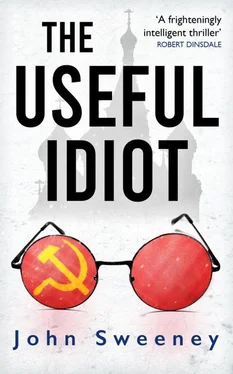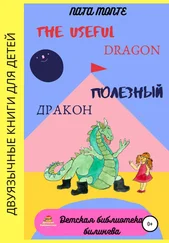John Sweeney - The Useful Idiot
Здесь есть возможность читать онлайн «John Sweeney - The Useful Idiot» весь текст электронной книги совершенно бесплатно (целиком полную версию без сокращений). В некоторых случаях можно слушать аудио, скачать через торрент в формате fb2 и присутствует краткое содержание. Город: London, Год выпуска: 2020, Издательство: Silvertail Books, Жанр: Исторический детектив, Триллер, на английском языке. Описание произведения, (предисловие) а так же отзывы посетителей доступны на портале библиотеки ЛибКат.
- Название:The Useful Idiot
- Автор:
- Издательство:Silvertail Books
- Жанр:
- Год:2020
- Город:London
- ISBN:нет данных
- Рейтинг книги:4 / 5. Голосов: 1
-
Избранное:Добавить в избранное
- Отзывы:
-
Ваша оценка:
- 80
- 1
- 2
- 3
- 4
- 5
The Useful Idiot: краткое содержание, описание и аннотация
Предлагаем к чтению аннотацию, описание, краткое содержание или предисловие (зависит от того, что написал сам автор книги «The Useful Idiot»). Если вы не нашли необходимую информацию о книге — напишите в комментариях, мы постараемся отыскать её.
* * *
The Useful Idiot — читать онлайн бесплатно полную книгу (весь текст) целиком
Ниже представлен текст книги, разбитый по страницам. Система сохранения места последней прочитанной страницы, позволяет с удобством читать онлайн бесплатно книгу «The Useful Idiot», без необходимости каждый раз заново искать на чём Вы остановились. Поставьте закладку, и сможете в любой момент перейти на страницу, на которой закончили чтение.
Интервал:
Закладка:
“Does that go for Aubyn’s line on the famine being a monstrous lie?”
“Of course. But as I’ve said before, who cares? They’re only Russians.”
Duranty smiled, knowingly, at them both and walked off to join his new Uzbek woman. When he said something to her, she burst out laughing – and together they disappeared into a Mercedes. The doors closed softly and it slid quietly away.
Jones and Evgenia were still standing on the steps of the House of the Unions when they were approached by a small boy, pitifully thin, his face old before its time. Out of habit, Jones was about to delve into his pockets and fetch a kopek when the boy handed him an envelope.
He opened it. Inside was the shortest letter he had ever received. In hand-writing that crabbed across the page, it read, “Come see me. Bill.” There was an address, somewhere nondescript, nothing more.
Haywood was dirt-poor so, out of necessity, he lived out in the sticks, seven long miles north of the Kremlin. They took a droshki, the driver a thing plucked out of some nightmare, an Egyptian mummy swaddled in black, only his eyes alive. The old nag that pulled the carriage was so pitifully thin that they could see her ribs move with every breath.
“Get a move on, kolkhoznik!” the cabbie called out..
Evgenia explained that it meant a collective farmer, who, according to the general party line, were all fabulously lazy. The droshki was beyond cold, agonisingly uncomfortable and horribly slow, so slow that it would be impossible for the Cheka to follow them by car without them knowing. That did not happen. Even so, they paid off the droshki half a mile from where Haywood lived, then tramped through the snow and frozen slush, clinging onto each other for support. Out here, on the edge of the city, the towering apartment blocks gave way to homes made of brick, then of wood. They called them izba , log cabins, the fancier ones with sizeable yards walled off from the world.
Soon, certain that they were not being followed, they reached Haywood’s izba and knocked on the door. Very softly, Evgenia whistled Let My People Go. After a long time, the door swung open, a candle casting a flickering light on the face of Big Bill Haywood. He’d lost a lot of weight, his face haggard, his eyes dull, the spirit of the man broken.
“You folks had better come in.”
It felt colder inside than out. The wooden stove had long gone out, icicles hung from the ceiling, and the water in the kitchen sink had frozen, locking in dishes and glasses in ice. Evgenia said that she would go and buy some wood for the fire.
“Get some vodka too,” Haywood rumbled.
“Yes, boss,” said Evgenia.
“I’m no-one’s boss. I’m A Wobbly ‘till the day I die… which is pretty damn soon.” Haywood started to laugh but it turned into a battle for his next breath.
Now that Evgenia had gone, Jones took the candle from him and helped the old man to a chair. It was a poor house, no doubting it. There was a rough wooden table, a bed with a quilt, a tiny kitchen of sorts. One wall was lined with books: Marx, Lenin, Jack London, Mark Twain, Shakespeare, Keats, Shelley. Jones lingered over a copy of Macbeth and pulled it out. The book fell open and, by the feeble light from the candle, he found himself reading out loud:
“Thou liest, abhorred tyrant; with my sword I'll prove the lie thou speak'st.”
Jones paused.
“Go on,” said Haywood.
“It’s just a stage instruction.”
“Read it.”
“ They fight and Young Siward is slain.”
“That’s what’s happened here. We thought that there was a great revolution taking place, that the bosses were being made to kneel before the workers. Got that wrong, big time. All that’s happened is that the whole of Russia is the stage for a new version of Macbeth, one with lies and blood and a lying abhorred tyrant, name of Stalin.” Then he started to cough, helpless, a man drowning in his own phlegm.
Jones sat on the arm of the chair, his hand patting Haywood on the back.
“You don’t look good, old man.”
The whites of his eyes rolled upwards in his head. “Sounds paranoid but…” Haywood reached up to his scalp and pulled out a chunk of hair which came out in his hand with no effort at all. He examined it with a mixture of disgust and wonderment. “I think the bastards are poisoning me. They heard about Stalin’s Epigram. Fancy being killed for reading out a poem. What kind of country is this?”
Jones said nothing.
“Thing is, Garry, I think we have a traitor in our midst and I think they’re trying to knock me off before I can prove my suspicion.”
At that very moment, the door opened and Evgenia returned, clutching firewood, bread, sausage and vodka. Haywood fell silent, looked down and very deftly retched into a bucket.
Jones lit the fire while Evgenia broke open the bread and diced the sausage.
“In the shop they called the sausage Budenny’s First Cavalry,” she said.
“What’s that mean?” asked Jones, puzzled.
“The sausage is not from a cow.”
Uncorking the bottle of vodka, she found three dirty glasses and went out to clean them in the snow.
Haywood’s use of the word “traitor” hung in the air, a challenge not taken up by Evgenia. Ordinarily Jones would have disregarded the idea, told the old man not to be so crazy. But in that time, in that place, fear of betrayal was a rational, logical response.
Jones could not endure the silence for long. “What are you talking about a traitor for?”
“The Cheka know everything. They know that I read out the poem. They’ve asked everyone else about it, just not me. They’re rolling up our network, no question, and she’s been seen going in and out of the Lubyanka like she owned the place.”
“She translates for them, from time to time. She has no choice.”
The dying man studied him coldly. “In this world, son, there is always a choice. It’s only when you leave it that you have none.”
The door opened again, revealing Evgenia, and the two men fell silent.
When Evgenia passed him some bread and sausage, Jones had forgotten how hungry he was. As he fell on the food savagely, Evgenia passed Haywood a glass of vodka. Raising his glass, he made the toast. “To Max.”
The others echoed him and downed their vodkas in one – but, as she drank, Evgenia was glowering at Haywood, the big man returning her stare with something not far off loathing.
“What is it?” asked Jones.
Haywood picked up his bucket and retched into it, this time more noisily than before.
“He thinks I’m traitor,” said Evgenia in her dry official voice.
“Nope,” said Haywood, “I ain’t saying that. I’m saying that you’ve been seen walking in and out of the Lubyanka like it’s some fancy department store, like Macy’s or whatever.”
“Then someone has been dripping poison into your ear.”
“Or someone’s been telling the truth.”
She slapped him hard. The old man, almost twice her size, fell like an oak in a thunderstorm, crashing to the ground with a great thunk. Jones hurried to tend to him, lifted him up. Only once Haywood was back on his chair did he turn to Evgenia.
“He’s… he’s… he’s…” Jones’ stammer always reappeared at the worst moments. “He’s an old man. Sick too. You don’t hit an old man like that. What are you doing?”
She stormed out of the izba. To Jones’ amazement, Haywood started to laugh, a great fat belly laugh.
“What’s so funny?”
The laughter subsided and the old man’s eyes went to the bottle of vodka. Jones got the bottle and poured him a slug.
“You were about to explain what amused you so?”
Читать дальшеИнтервал:
Закладка:
Похожие книги на «The Useful Idiot»
Представляем Вашему вниманию похожие книги на «The Useful Idiot» списком для выбора. Мы отобрали схожую по названию и смыслу литературу в надежде предоставить читателям больше вариантов отыскать новые, интересные, ещё непрочитанные произведения.
Обсуждение, отзывы о книге «The Useful Idiot» и просто собственные мнения читателей. Оставьте ваши комментарии, напишите, что Вы думаете о произведении, его смысле или главных героях. Укажите что конкретно понравилось, а что нет, и почему Вы так считаете.












